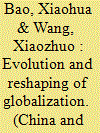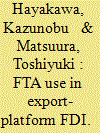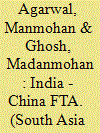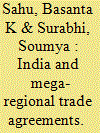| Srl | Item |
| 1 |
ID:
164720


|
|
|
|
|
| Summary/Abstract |
With the weakening role of the World Trade Organization multilateral trading system, the globalization pattern is moving toward regional economic integration. As a result, the number of regional trade agreements (RTAs) has rapidly increased. New trends in international economics and trade, such as the withdrawal of the US from the Trans‐Pacific Partnership and the trade disputes between the US and China, have revealed the intention of the developed countries represented by the US to reshape the direction of globalization. This paper combines the relevant research conclusions and current stylized facts to examine the evolution and reshaping of globalization. We find that: (i) countries have different attitudes toward the recent round of globalization, which are related to changes in the patterns of income distribution within countries caused by the last round of globalization; and (ii) regional economic development is an effective way to reshape globalization. The self‐strengthening effect of the hub country in the trade network has promoted global RTA expansion.
|
|
|
|
|
|
|
|
|
|
|
|
|
|
|
|
| 2 |
ID:
154532


|
|
|
|
|
| Summary/Abstract |
Multinational enterprises (MNEs) actively use overseas affiliates to trade with third countries (i.e., neither the home country nor host country). In this paper, we empirically identify significant firm characteristics that influence the use of FTAs in export-platform Foreign Direct Investment (FDI). Specifically, we investigate the correlation of FTA use with: the share of "originating inputs"; intensity of exports to the third country; and experience using FTAs in exporting to other third countries. Then, we further investigate the difference in such characteristics according to the size of the parent company in order to clarify why the use of FTAs from platform countries is different between overseas affiliates owned by large firms versus small- and medium-sized enterprises (SMEs). To this end, we employ a unique dataset collected by the Japan External Trade Organization for 2012 and 2013. We found that Japanese affiliates owned by large parent firms are more likely to use FTA schemes in exporting than those owned by SMEs. In terms of Rules of Origin (ROO) compliance however, most affiliates owned by either SMEs or large parent companies have no difficulty because they already have a sufficiently high share of originating inputs. Therefore, we find that the major obstacle to FTA utilization concerns how to obtain certificates of origins (COOs) rather than complying with ROOs.
|
|
|
|
|
|
|
|
|
|
|
|
|
|
|
|
| 3 |
ID:
109730


|
|
|
| 4 |
ID:
155023


|
|
|
|
|
| Summary/Abstract |
Basanta K Sahu and Soumya Surabhi discuss India’s participation in and the likely effects of some mega-regional trade agreements with a focus on the Trans-Pacific Partnership and the Regional Comprehensive Economic Partnership. Based on in-depth analysis, they highlight some major impacts of the evolving trade agreements and offer time bound roadmaps for India to benefit from them.
|
|
|
|
|
|
|
|
|
|
|
|
|
|
|
|
| 5 |
ID:
154263


|
|
|
|
|
| Summary/Abstract |
Regional trade agreements (RTAs) have proliferated in the last few decades in various forms all over the world and now number in the hundreds. In Asia, many came up or were reinforced after the 1997–98 financial crisis. India has signed a number of RTAs (28 as of now) with various Southeast Asian countries and with ASEAN as a whole. Another important development has been India's admission into the Regional Economic Comprehensive Partnership known as ASEAN+6, intended to facilitate Pan-Asian and Asia-Pacific integration, although it poses a risk to Indian industry faced with growing Chinese competition and market penetration.
|
|
|
|
|
|
|
|
|
|
|
|
|
|
|
|
| 6 |
ID:
124308


|
|
|
|
|
| Publication |
2013.
|
| Summary/Abstract |
A long list of products in sensitive list maintained by the member countries is one of the major weaknesses of SAFTA agreement for its effective operation. Present study analyzes the sensitive list of Bangladesh with a view to identify products for pruning. Pruning the sensitive list should follow justifiable method based on arguments and reasoning, particularly against the rationale behind keeping the products in the sensitive list. The study identified a set of sensitive products that could be pruned from the list taking into account their competitiveness, trade potentials and extent of revenue collected from those products. Analysis reveals that identified sensitive products, if pruned from the list, would have insignificant adverse effect on local industries since those are raw materials, intermediate products and capital machineries which have limited domestic production capacity. The method can be followed by other member countries of the SAFTA to prune their sensitive lists.
|
|
|
|
|
|
|
|
|
|
|
|
|
|
|
|
| 7 |
ID:
084770


|
|
|
| 8 |
ID:
065898


|
|
|
| 9 |
ID:
177651


|
|
|
|
|
| Summary/Abstract |
Passage of the African Continental Free Trade Area (CFTA)
occurs at a time of rising tensions between the United States
and China. Africa’s growth and development prospects depend on a functioning and stable multilateral trading system, but recourse to economic nationalism and protectionism is increasingly undermining the open global economy
and, indeed, the liberal international order on which free
and fair trade depends. This article examines the implications of US-China tensions for the CFTA while assessing the
opportunity for closer engagement between African countries and an axis of emerging powers led by China in an enhanced Global South strategy
|
|
|
|
|
|
|
|
|
|
|
|
|
|
|
|